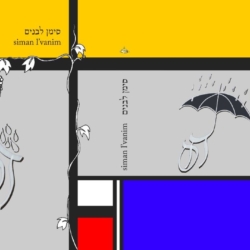| Source (Hebrew) | Translation (English) |
|---|---|
ברכות שעשני |
Blessings She’asani (that made me)[1] Cf. Rebbe Yehudah’s statement in Tosefta Berakhot 6.23 and Rebbe Meir’s statement in Menachot.43b.17 |
בָּרוּךְ אַתָּה יְיָ אֱלֹהֵינוּ מֶלֶךְ הָעוֹלָם, שֶׁעָשַׂנִי בְּצָלְמוֹ׃ |
Barukh attah Yah I offer You thanks, Cosmic Majesty And worship You, For shaping my life in Your image.[2] Sabbath and festival prayer book, United Synagogue of America 1946, Cf. Genesis 1:27 |
בָּרוּךְ אַתָּה יְיָ אֱלֹהֵינוּ מֶלֶךְ הָעוֹלָם, שֶׁעָשַֽׂנִי כִּרְצוֹנוֹ׃ |
Barukh attah Yah I offer You thanks, Cosmic Majesty And worship You, For giving me options.[3] Rabbi Yaakov ben Asher, Arba Turim, circa early 14th century. Abu Dirham notes this formulation was new in his time. |
בָּרוּךְ אַתָּה יְיָ אֱלֹהֵינוּ מֶלֶךְ הָעוֹלָם, שֶׁעָשַׂנִי יִשְׂרָאֵל׃ |
Barukh attah Yah I offer You thanks, Cosmic Majesty And worship You, For giving me the privilege To worship You, as a Jew.[4] Sabbath and festival prayer book, United Synagogue of America 1946, Cf. Genesis 32:29 |
[”כי משי אפיה לימא“ (ברכות ס ב)] |
Upon washing the face the following blessing is said:[5] Berakhot 60b.6 |
בָּרוּךְ אַתָּה יְיָ אֱלֹהֵינוּ מֶלֶךְ הָעוֹלָם, הַמַּעֲבִיר שֵׁנָה מֵעֵינָי וּתְנוּמָה מֵעַפְעַפָּי: |
Barukh attah Yah I offer You thanks, Cosmic Majesty And worship You, For removing The last trace of sleep from my eyes. |
Rabbi Zalman Schachter-Shalomi, z”l, included his translation of the Birkhot haShaḥar in his Siddur Tehillat Hashem Yidaber Pi (2009). To the best of my ability, I have set his English translation side-by-side with the Hebrew phrases comprising the blessings. I also want to share a dvar tefillah on the following.
While preparing this work and noticing for the first time the overlapping themes of dawn, blessing, the multiple and bookending blessings concerning perception, the invocation of the name Yisra’el, and the final blessing, in its context in Berakhot 60b after washing one’s face, the valence of the ritual washing of one’s hands after contact with death, and Reb Zalman’s interpretive translation “As we face you” for “be’einekha” (lit. “in your eyes”), I came to an insight that these birkhot hashaḥar may be read as framed by the story of Yaakov wrestling until dawn with the angel he forces to bless him, and which he names Peniel (Genesis 32:25-31).
Source (Hebrew) Genesis 32:25-31 Translation (English)
וַיֵּאָבֵ֥ק אִישׁ֙ עִמּ֔וֹ עַ֖ד עֲל֥וֹת הַשָּֽׁחַר׃
וַיַּ֗רְא כִּ֣י לֹ֤א יָכֹל֙ ל֔וֹ
וַיִּגַּ֖ע בְּכַף־יְרֵכ֑וֹ
וַתֵּ֙קַע֙ כַּף־יֶ֣רֶךְ יַעֲקֹ֔ב בְּהֵֽאָבְק֖וֹ עִמּֽוֹ׃
וַיֹּ֣אמֶר שַׁלְּחֵ֔נִי כִּ֥י עָלָ֖ה הַשָּׁ֑חַר
וַיֹּ֙אמֶר֙ לֹ֣א אֲשַֽׁלֵּחֲךָ֔ כִּ֖י אִם־בֵּרַכְתָּֽנִי׃
וַיֹּ֥אמֶר אֵלָ֖יו מַה־שְּׁמֶ֑ךָ
וַיֹּ֖אמֶר יַעֲקֹֽב׃
וַיֹּ֗אמֶר לֹ֤א יַעֲקֹב֙ יֵאָמֵ֥ר עוֹד֙ שִׁמְךָ֔ כִּ֖י אִם־יִשְׂרָאֵ֑ל
כִּֽי־שָׂרִ֧יתָ עִם־אֱלֹהִ֛ים וְעִם־אֲנָשִׁ֖ים וַתּוּכָֽל׃
וַיִּשְׁאַ֣ל יַעֲקֹ֗ב וַיֹּ֙אמֶר֙ הַגִּֽידָה־נָּ֣א שְׁמֶ֔ךָ
וַיֹּ֕אמֶר לָ֥מָּה זֶּ֖ה תִּשְׁאַ֣ל לִשְׁמִ֑י
וַיְבָ֥רֶךְ אֹת֖וֹ שָֽׁם׃
וַיִּקְרָ֧א יַעֲקֹ֛ב שֵׁ֥ם הַמָּק֖וֹם פְּנִיאֵ֑ל
כִּֽי־רָאִ֤יתִי אֱלֹהִים֙ פָּנִ֣ים אֶל־פָּנִ֔ים
וַתִּנָּצֵ֖ל נַפְשִֽׁי׃
And a man wrestled with him until the break of dawn.
When he saw that he had not prevailed against him,
he wrenched Yaakov’s hip at its socket,
so that the socket of his hip was strained as he wrestled with him.
Then he said, “Let me go, for dawn is breaking.”
But he answered, “I will not let you go, unless you bless me.”
Said the other, “What is your name?”
He replied, “Yaakov.”
Said he, “Your name shall no longer be Yaakov, but Yisrael,
for you have striven with beings divine and human, and have prevailed.”
Yaakov asked, “Pray tell me your name.”
But he said, “You must not ask my name!”
And he took leave of him there.
So Yaakov named the place Peniel,
meaning, “I have seen a divine being face to face,
yet my life has been preserved.”
As we arouse ourselves from sleep, an intimate experience with “1/60th of death”[6] Cf. Berachot 57b, Midrash Rabbah Genesis 17:7 , we bless Hashem that we may perceive (or benefit from other’s perception) of the dawn as well as our eponymous ancestor’s taking by force the blessing of the name Yisra’el which informs our daily identity and actions, may our wrestling with these challenges be righteous and just in the perception of our peers and in the judgement of our elo’ah who is Just. –Aharon N. Varady
Source(s)


Notes
| 1 | Cf. Rebbe Yehudah’s statement in Tosefta Berakhot 6.23 and Rebbe Meir’s statement in Menachot.43b.17 |
|---|---|
| 2 | Sabbath and festival prayer book, United Synagogue of America 1946, Cf. Genesis 1:27 |
| 3 | Rabbi Yaakov ben Asher, Arba Turim, circa early 14th century. Abu Dirham notes this formulation was new in his time. |
| 4 | Sabbath and festival prayer book, United Synagogue of America 1946, Cf. Genesis 32:29 |
| 5 | Berakhot 60b.6 |
| 6 | Cf. Berachot 57b, Midrash Rabbah Genesis 17:7 |

“בְּרָכוֹת שֶׁעֲשָׁנִי | Blessings at your Dawn of Wakefulness: Berakhot she’Asani (blessings that made me) — translated by Rabbi Zalman Schachter-Shalomi” is shared through the Open Siddur Project with a Creative Commons Attribution-ShareAlike 4.0 International copyleft license.









Comments, Corrections, and Queries